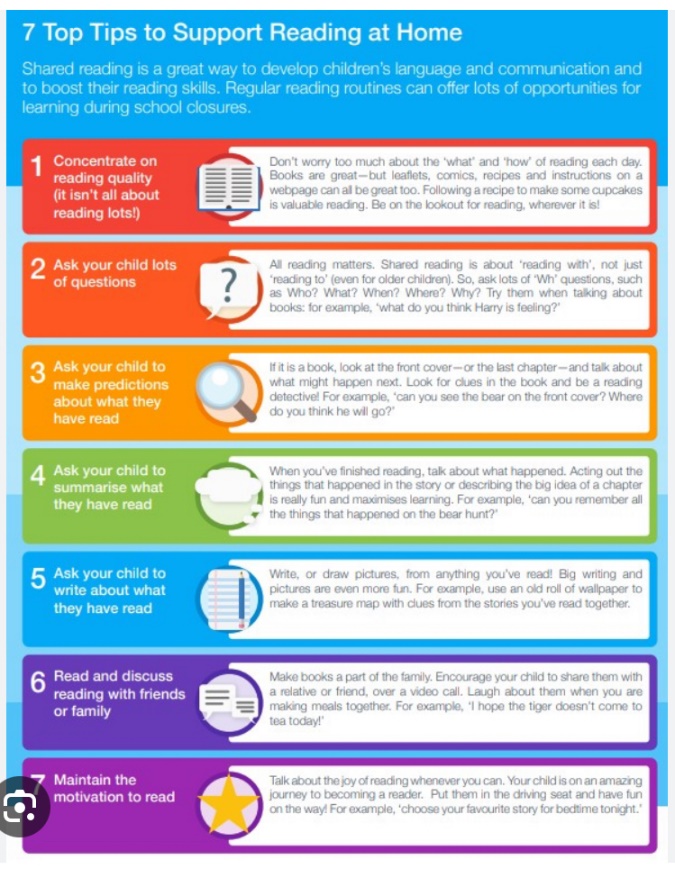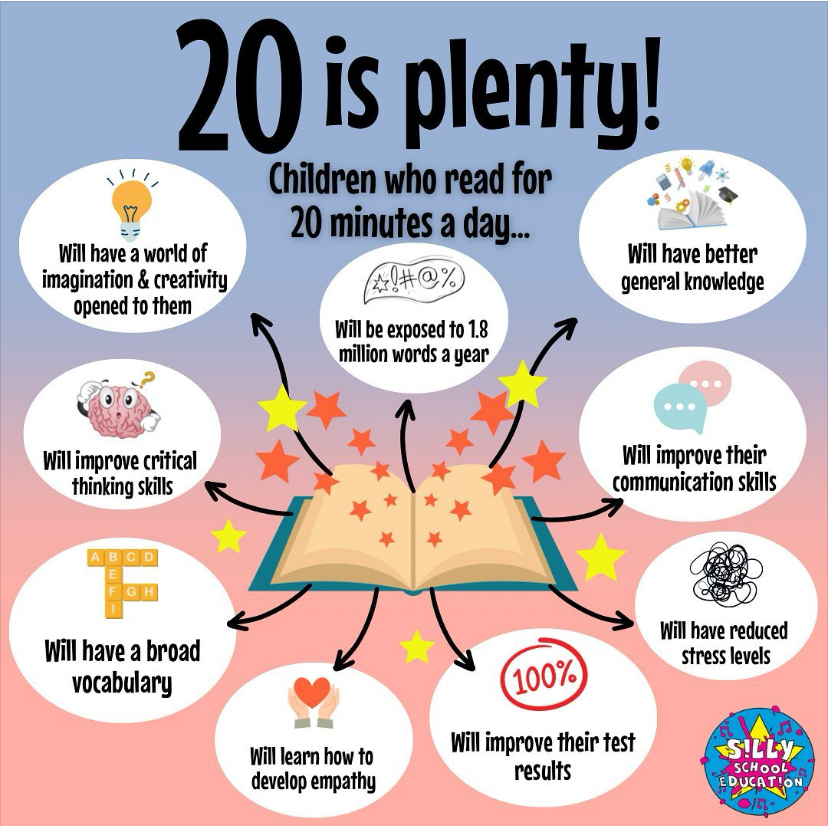Reading aloud to children is the best way to get them interested in reading. With this becoming part of a bedtime routine, they will grow to love stories and books. Eventually they will want to read on their own. With the help of parents and carers, children can learn how to read and can practise reading until they can read for their own enjoyment. When you help your child learn to read, you are opening the door to a world of books and learning. Then they will have a whole world of information and knowledge at their fingertips!
Family engagement in children reading at home is valued highly in our school. Reading at home is fun and gives children such a boost to their confidence and interest in learning to read. Reading support at home makes for quicker progress and quality time between child and parent.
RWI teachers send links on Class Dojo for the practising of sounds and reading red words every week on homework sways.
We value open communication with our families and invite home reading comments from families in the reading record given to each child. Children love to be praised by their families, but worries or queries are welcome too.
This reading doesn’t just have to be their reading book, although that’s a great start. Also, reading doesn’t stop once we know all the letters and sounds – read with your child for as long as they will let you. All types of reading are useful – try as many as you can, for example:
- Start with your child’s reading scheme book. These books will improve reading skills at the just the right level to give challenge and practise. Moving up through the colours or levels can be very important to children and this will help them progress
- Try and read other books at the same level as your child’s reading book. Look at Reading with Oxford or our free ebook library for inspiration
- Follow your child’s natural interest and look up information on the internet. They won’t notice that they are practising their reading. They will also be practising vital retrieval and research skills
- Some children just prefer non-fiction. Reading non-fiction is a great way to improve vocabulary, learn how to tackle new words, improve knowledge and develop a love for reading. Joke books, fact books, top ten books are all just as good for learning to read as reading fiction
- Many children love graphic novels or comics. These are great for developing imagination. Children also learn how stories are presented in different ways and understand how pictures and text work together. There’s also quite a bit of reading between the lines needed here
- Read signs and information boards as you are out and about. These often contain new vocabulary to discuss. Recipes or instructions for craft projects are also great for this and also encourage us to read with accuracy
- Try to encourage your child to tackle a longer fiction story. Reading a longer story for pleasure has many benefits. It develops imagination and empathy; it builds reading stamina and introduces new vocabulary and sentence styles
- Although they don’t practise phonics, listening to audiobooks does practise comprehension skills and might even encourage your child to read other books for themselves. Listening to books develops imagination, teaches new vocabulary, and allows your child to experience books above their reading age.
Free Readers
Beyond the RWI scheme, all of our children have access to their class library reading books, which they can change whenever they wish. We expect children to be reading at home daily. Ten minutes a day will really help to develop fluent and confident readers.
Click below for top tips on supporting reading at home:

Further Support
Please click on the links below for more resources and support:
- The Literacy Trust has launched a portal for parents/carers which they are update regularly. It is split into age groups with a wealth of wonderful resources, access to books, audio books and videos as well as lots of simple ideas and activities to engage your child at home.
- The Book Trust has information about books and top tips, including a Book Finder tool with advice about which book your child might like based on the books he/she has enjoyed so far. This includes a Home Time section with online books, videos, quizzes, illustrator workshops, competitions and activities.
- CLPE (Centre for Literacy in Primary Education) has a bank of free resources, including poems and videos of poets reading their poems. You need to register (but it is free) to access some of their site.
- World Book Day Family Hub World Book Day is about celebrating books and reading all year round and this site provides video stories and activities to enjoy together, free audio books and games to enjoy.
- Oxford Owl have over 100 e-books for children aged 3 – 11 years to read for free.
- Love My Books has lots of ideas to help children and parents/carers enjoy reading together.
- International Children’s Digital Library has a range of online books in a range of different languages.
- BBC Bitesize has plenty of reading activities, and there's lots of stories to listen to on CBeebies.
- The World of David Walliams - One free audio book reading is available to listen to every day
- Poetry By Heart - A wide selection of poetry covering different topics
- Julia Donaldson and Axel Scheffler Home Learning Packs - Free activity packs for 3-7 year olds to complete as you read the books
- Parent guide to Read Write Inc. Phonics - Oxford Owl

KS1 Reading Workshop
KS2 Reading Workshop